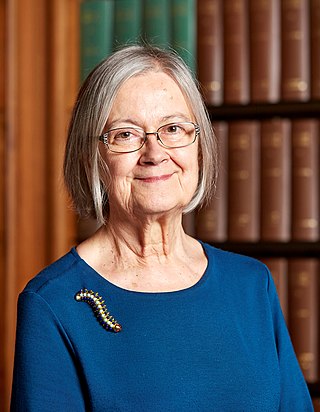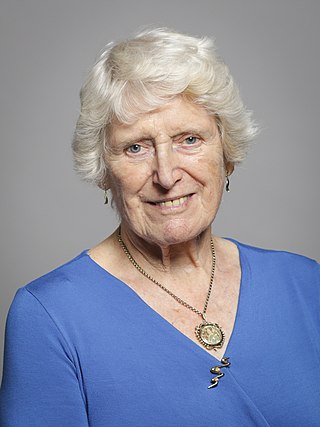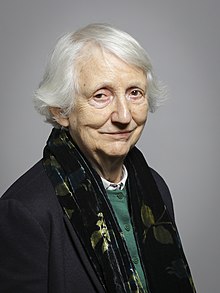
Helena Ann Kennedy, Baroness Kennedy of The Shaws,, is a Scottish barrister, broadcaster, and Labour member of the House of Lords. She was Principal of Mansfield College, Oxford, from 2011 to 2018. A Bencher of Gray's Inn, an Honorary Writer to the Signet and the recipient of 42 Honorary Degrees from many universities including those of Glasgow and Edinburgh in recognition of work on women and the law and on widening participation in higher education. She is President of Justice, the law reform think tank and currently is director of the International Bar Association's Institute of Human Rights.

Sir Bernard Arthur Owen Williams, FBA was an English moral philosopher. His publications include Problems of the Self (1973), Ethics and the Limits of Philosophy (1985), Shame and Necessity (1993), and Truth and Truthfulness (2002). He was knighted in 1999.

Julia Elizabeth King, Baroness Brown of Cambridge, is a British engineer and a crossbench member of the House of Lords, where she chairs the Select Committee on Science and Technology. She is the incumbent chair of the Carbon Trust and the Henry Royce Institute, and was the vice-chancellor of Aston University from 2006 to 2016.

Brenda Marjorie Hale, Baroness Hale of Richmond,, is a British judge who served as President of the Supreme Court of the United Kingdom from 2017 until her retirement in 2020.

Ann Elizabeth Oldfield Butler-Sloss, Baroness Butler-Sloss, GBE, PC, is a retired English judge. She was the first female Lord Justice of Appeal and was the highest-ranking female judge in the United Kingdom until 2004, when Baroness Hale was appointed to the House of Lords. Until June 2007, she chaired the inquests into the deaths of Diana, Princess of Wales, and Dodi Fayed. She stood down from that task with effect from that date, and the inquest was conducted by Lord Justice Scott Baker.

Nancy Cartwright, Lady Hampshire is an American philosopher of science. She is a professor of philosophy at the University of California at San Diego and the University of Durham. Currently, she is the President of the Division for Logic, Methodology and Philosophy of Science and Technology of the International Union of History and Philosophy of Science and Technology.

Patricia Lesley Hollis, Baroness Hollis of Heigham, PC, DL was an historian and a Labour member of the House of Lords of the United Kingdom.

Helen Mary Warnock, Baroness Warnock, was an English philosopher of morality, education, and mind, and a writer on existentialism. She is best known for chairing an inquiry whose report formed the basis of the Human Fertilisation and Embryology Act 1990. She served as Mistress of Girton College, Cambridge from 1984 to 1991.
David Wiggins is an English moral philosopher, metaphysician, and philosophical logician working especially on identity and issues in meta-ethics.
Walter Bryce Gallie was a Scottish social theorist, political theorist, and philosopher.

Jonathan Wolff is a British philosopher and academic. He was Professor of Philosophy and Dean of the Faculty of Arts and Humanities at University College London (UCL) in 2012–16.

Pauline Perry, Baroness Perry of Southwark is an educator, educationist, academic, and activist. She is a Conservative politician and was for 25 years a working member of the British House of Lords. In 1981 she became Her Majesty's Chief Inspector of Schools in England. In 1986 she became Vice-Chancellor of South Bank Polytechnic, and serving during its transition to a university, became the first woman in history to run a British university.
Michael Friedman is an American philosopher who serves as Suppes Professor of Philosophy of Science and Professor, by courtesy, of German Studies at Stanford University. Friedman is best known for his work in the philosophy of science, especially on scientific explanation and the philosophy of physics, and for his historical work on Immanuel Kant. Friedman has done historical work on figures in continental philosophy such as Martin Heidegger and Ernst Cassirer. He also serves as the co-director of the Program in History and Philosophy of Science and Technology at Stanford University.
Raymond Plant, Baron Plant of Highfield,, is a British Labour peer and academic.
Mary Margaret Anne McCabe, known as M. M. McCabe, is emerita professor of ancient philosophy at King's College London. She has written books on Plato and other ancient philosophers, including the pre-Socratics, Socrates and Aristotle.

The Berggruen Institute is a Los Angeles-based think tank founded by Nicolas Berggruen.
Sarah Jean Broadie was a British philosopher, a Professor of Moral Philosophy and Wardlaw Professor at the University of St Andrews. Broadie specialised in ancient philosophy, with a particular emphasis on Aristotle and Plato. Her work engages with metaphysics and both ancient and contemporary ethics. She achieved numerous honours throughout her career as an academic philosopher. Broadie studied Greats at Somerville College, Oxford, graduating in 1960. Previously she worked at the University of Edinburgh, University of Texas at Austin, Yale, Rutgers, and Princeton.











